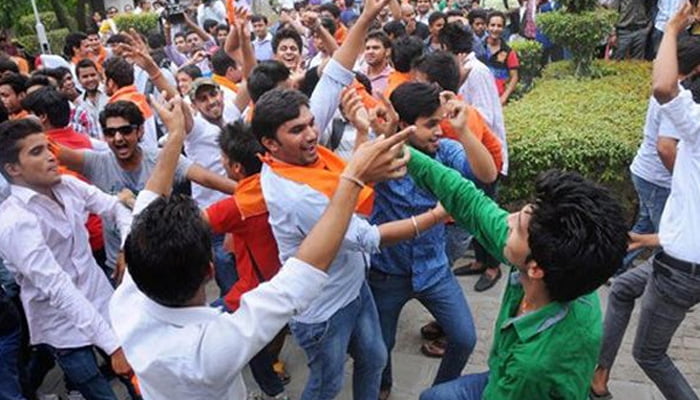
All India Students Association (AISA), which swept the elections last two years, lost the top post by a margin of 67 votes and could manage only two seats, that of Vice President and General Secretary in this year’s election, the results for which were declared today.
BJP’s student wing Akhil Bhartiya Vidyarthi Parisahad (ABVP) which swept the Delhi University polls yesterday, made a comeback in the JNUSU Central Panel after 14 years and grabbed the Joint Secretary position, defeating the AISA candidate by a small margin of 28 votes.
Also Read: Shehla Rashid becomes first Kashmiri girl to win JNU polls
In the Left-dominated JNU campus, surprisingly the right-wing ABVP has stood second in two of the four central panel seats – Vice President and General Secretary.
“Kanhaiya Kumar, who won the race for the union President’s post, secured a total of 1029 votes defeating AISA’s Vijay Kumar, who polled 962 votes and lost the top post by a margin of 67 votes,” the CEC for JNUSU polls Praveen Thallapelli said.
Shehla Rashid Shora and Rama Naga who were AISA’s nominee for the post of Vice President and General Secretary polled 1387 and 1159 votes respectively defeating ABVP candidates Valentina Brahma and Devendra Singh Rajput.
ABVP’s Saurabh Kumar Sharma, won the Joint Secretary post by defeating AISA’s Hamid Raza by 27 votes.
Senior BJP leader Sandeep Mahapatra, had won the President’s post in 2001 by a margin of mere 1 vote and ABVP hasn’t managed a single seat since then.
For the last two years, AISA had been sweeping the polls by bagging all four positions.
Kanhaiya, who was the show-stealer at the Presidential debate, said “Students were disappointed with AISA as the promises made by it in the recent years have not been fulfilled. The major issue of hostels which they had raised remains unresolved even after them being in power twice.”
“The political process on the campus is declining. We want to revive the legacy of JNU. A big barrier to it is the Lyngdoh committee. We want to defy Lyngdoh and restore our constitution,” he added.
The newly elected president also said that his party is against the “saffronisation” of institutions in the country.
“If this is done at JNU we will fight against it strongly. We are in support of the FTII students who are protesting saffronisation of their campus, and if an attempt is made here, we will also start a movement here,” he said.
The ABVP’s winning candidate said, “Our success is a
result of the hard work done by our activists. Our vote share is very high this time. This shows that the students are disappointed with the ineffectiveness of Left politics.”
Thirty-one councillors belonging to several schools in JNU were also elected today.
While 11 of the councillor posts have been bagged by ABVP, nine have been wrested by AISA.
Independent candidates have emerged victorious on the remaining seats.
As the results came out today, students gathered outside the School of International Studies (SIS), and amid raising of red and saffron flags and chanting of slogans, the new panel was sworn in at a ceremony.
In the JNUSU polls held on September 11, more than 53 per cent students had exercised their franchise.
A total of 22 candidates tested their electoral fortunes for the Central Panel and 83 were in fray for the post of councillors.
While seven candidates from major students’ organisations were in the fray for the coveted presidential post in the JNU Students’ Union (JNUSU), four candidates for the posts of Vice-President, six and five nominees for General Secretary and Joint Secretary respectively contested the polls.
Safety on campus and better hostel facilities were among the key issues raised by the candidates of various students’ organisations.
The issues also found their place in traditional JNU graffitis and handmade posters.
The parties contesting the elections include All India Students Association (AISA), All India Students Federation (AISF), Akhil Bhartiya Vidyarthi Parishad (ABVP), Students Federation of India (SFI), National Students Union of India (NSUI), Democratic Student’s Federation (DSF) and Birsa Ambedkar Phule Students’ Association (BAPSA).
JNUSU is the representative body of the students in the varsity. The polls have been keenly contested over decades.
[“Source- zeenews”]

